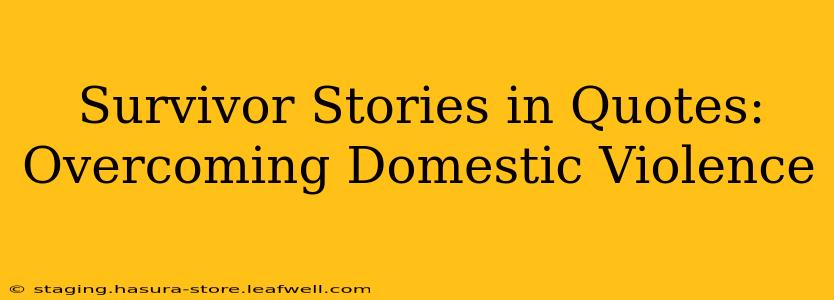Domestic violence is a pervasive issue affecting millions worldwide. While statistics paint a grim picture, the true impact is felt in the individual stories of survivors. Their journeys, marked by pain, resilience, and ultimately, triumph, offer powerful inspiration and a crucial understanding of the complex reality of abuse. This article shares compelling quotes from survivors, highlighting their strength and the path to healing. We'll also address some frequently asked questions about escaping and recovering from domestic violence.
What are some common signs of domestic violence?
Recognizing the signs of domestic violence is crucial, both for those experiencing it and for those who might be able to offer support. Common signs can include physical abuse (bruises, injuries), emotional manipulation (constant criticism, control), controlling behavior (restricting access to finances, friends, or family), threats of violence, and isolation from support networks. It's important to remember that abuse isn't always physical; emotional and psychological manipulation can be equally damaging. If you or someone you know is experiencing these behaviors, please seek help.
How can I escape an abusive relationship?
Escaping an abusive relationship requires careful planning and often involves seeking support from external resources. This can include reaching out to a domestic violence hotline, seeking help from law enforcement, confiding in trusted friends or family members, or finding shelter in a safe house. Creating a safety plan—a detailed plan outlining escape routes, emergency contacts, and financial strategies—is crucial. There are organizations dedicated to helping survivors develop safety plans and access resources like legal aid and counseling.
What resources are available for victims of domestic violence?
Numerous resources are available to support victims of domestic violence. National and local hotlines provide immediate support and guidance. Shelters offer safe housing and essential services. Legal aid organizations can assist with obtaining restraining orders and navigating the legal system. Therapists specializing in trauma can provide counseling and support to help survivors process their experiences and heal. Remember, you are not alone, and help is available.
What does healing from domestic violence look like?
Healing from domestic violence is a deeply personal journey, and there's no single timeline. It involves acknowledging the trauma, processing emotions, rebuilding self-esteem, and establishing healthy boundaries. Professional therapy can be invaluable in this process. Many survivors find support in support groups, where they can connect with others who understand their experiences. Rebuilding trust, both in oneself and in others, is a crucial aspect of healing. This is often a long and challenging process, but ultimately, it's a path toward reclaiming one's life and finding peace.
“I survived because I learned to fight back, not physically, but emotionally and mentally.” – Anonymous Survivor
This powerful quote encapsulates the resilience many survivors demonstrate. Healing often begins with a shift in perspective, recognizing the strength within oneself to overcome adversity.
“Leaving was the hardest thing I ever did, but it was also the most liberating.” – Anonymous Survivor
The decision to leave an abusive relationship is often agonizing, but it marks a critical turning point towards freedom and recovery.
“I used to think I was alone, but I found out there were others who understood.” – Anonymous Survivor
Connecting with other survivors, either through support groups or online communities, can provide invaluable validation and support.
“Healing isn't linear. There will be good days and bad days, but progress is progress.” – Anonymous Survivor
The healing process is not straightforward; it's characterized by ups and downs, but forward movement, however small, is a sign of strength.
“I am a survivor, not a victim. My story is one of strength, resilience, and hope.” – Anonymous Survivor
This quote highlights the crucial shift from identifying as a victim to embracing one's identity as a survivor, empowering oneself through the narrative of their journey.
Disclaimer: This article provides general information and should not be considered professional medical or legal advice. If you or someone you know is experiencing domestic violence, please seek help from the appropriate resources. Information regarding specific resources can be found through online searches for "domestic violence resources [your location]".

